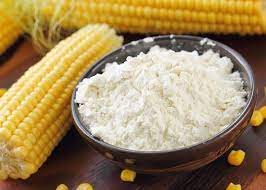
Corn flour is made from dried entire corn kernels processed into flour. It is a whole grain flour since it contains the hull, germ, and endosperm of corn. Corn flour is normally yellow, however, depending on the type of corn used, it can also be white or blue. It has a fine and smooth texture, similar to whole wheat flour.
Corn flour is mostly used for the preparation of bakery products and is applied in various skin exploitation. For the preparation of healthy pet foods, cornflour is mostly used.
Moreover, it is used in the various food industry like bakery products, snacks, ready-to-eat foods, and so on. Corn flour is used as an alternative for rice and wheat or mixed with wheat flour as a gluten-free product. Corn flour offers baked dishes and other meals structure. It's frequently coupled with a binder, like eggs, to give it shape.
Corn flour is often used in bread, muffins, waffles, pancakes, battered and fried meals, blinis, and other baked goods. Corn flour is like a thickening agent that is used to thicken soups and other liquid-based dishes including sauces, gravies, and custard. Although corn flour or corn starch tastes starchy and glucose tastes sweet, a spoonful of corn starch is truly chemically equivalent to a spoonful of glucose, at least so far as the body sees it.
Rapid urbanization, fast-paced lifestyles, and rising disposable income have accelerated the consumption of processed snacks, thus driving the corn flour market demand. It is widely used in products like pasta and soups along with a wide variety of ready-to-eat and ready-to-cook meals.
The growing consumption of corn flour can be attributed to the many health benefits associated with maize such as the maintenance of good bone health, bone strength, kidney functioning, and heart rate. Maize is packed with micro-nutrients and minerals including iron, zinc, magnesium, copper, manganese, and phosphate.
With the rising prevalence of heart diseases and diabetes and growing health-conscious consumers, the demand for corn flour-based snacks is expected to rise.
Corn flour is a versatile and widely used ingredient that has gained immense popularity in various culinary applications. In Nigeria, where corn (maize) is a staple crop and a significant part of the diet, the demand for corn flour continues to rise. This presents a lucrative opportunity for aspiring entrepreneurs to venture into corn flour production.
This article aims to provide a comprehensive guide on how to start a successful corn flour production business in Nigeria.
Conduct Market Research: Before delving into any business venture, it is crucial to conduct thorough market research. Identify the target market for your corn flour, including wholesalers, retailers, and individual consumers. Analyze the demand, competition, pricing, and distribution channels to understand the market dynamics and develop a robust business strategy.
Develop a Business Plan: A well-structured business plan is the foundation of any successful enterprise. Outline your goals, objectives, and strategies in detail. Determine the scale of your production, the required capital investment, and projected revenue and expenses. Include a comprehensive marketing plan and financial projections for at least the first three years.
Secure Financing: Starting a corn flour production business requires significant capital investment. Explore various financing options such as personal savings, loans from financial institutions, or seeking investment from potential partners. A solid business plan will assist you in securing the necessary funding.
Acquire Machinery and Equipment: Invest in high-quality machinery and equipment to ensure efficient production. The essential equipment includes corn cleaning and peeling machines, corn milling machines, flour sifters, packaging machinery, and storage facilities.
Conduct thorough research to select reliable suppliers who offer durable equipment suitable for your production capacity.
Source Raw Materials: Corn is the primary raw material for corn flour production. Establish relationships with local farmers, cooperatives, or agricultural associations to ensure a steady supply of high-quality corn.
Consider factors such as grain quality, moisture content, and impurity levels when sourcing corn. Establishing long-term contracts with farmers can help secure a consistent supply and maintain stable pricing.
Corn Processing:
The corn processing stage is critical for producing high-quality corn flour. The following steps outline the corn processing procedure:
a. Cleaning: Remove foreign materials such as stones, dust, and other impurities from the corn using cleaning equipment.
b. Peeling: Remove the outer skin (husk) of the corn kernels using specialized peeling machines.
c. Milling: Grind the peeled corn kernels into a fine powder using corn milling machines. This process may involve multiple stages of grinding to achieve the desired fineness.
d. Sifting: Pass the milled corn flour through sifters to remove any remaining impurities or coarse particles.
e. Packaging: Properly package the corn flour in suitable containers, ensuring it is sealed securely to maintain freshness.
Quality Control: Maintain stringent quality control measures throughout the production process to ensure a consistent and high-quality product. Implement regular testing for moisture content, impurities, and fineness of the flour. Adhere to food safety and hygiene standards to meet regulatory requirements.
Marketing and Distribution: Develop an effective marketing strategy to promote your corn flour brand. Utilize both traditional and digital marketing channels, including print media, online platforms, social media, and partnerships with retailers and distributors. Establish a robust distribution network to reach your target market efficiently.
Monitor and Adapt: Regularly monitor the performance of your corn flour production business and make necessary adjustments to optimize efficiency and profitability. Stay updated with market trends, consumer preferences, and technological advancements to stay competitive in the industry.
In conclusion, starting a corn flour production business in Nigeria can be a rewarding endeavor given the country's high demand for corn-based products. By following this comprehensive guide and combining it with your passion and dedication, you can lay a solid foundation for a successful corn flour production venture.
Remember to stay committed to quality, innovation, and customer satisfaction to thrive in the competitive market.






















